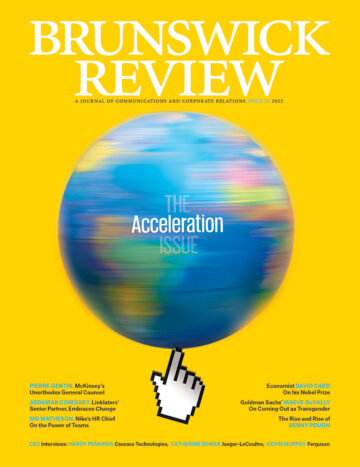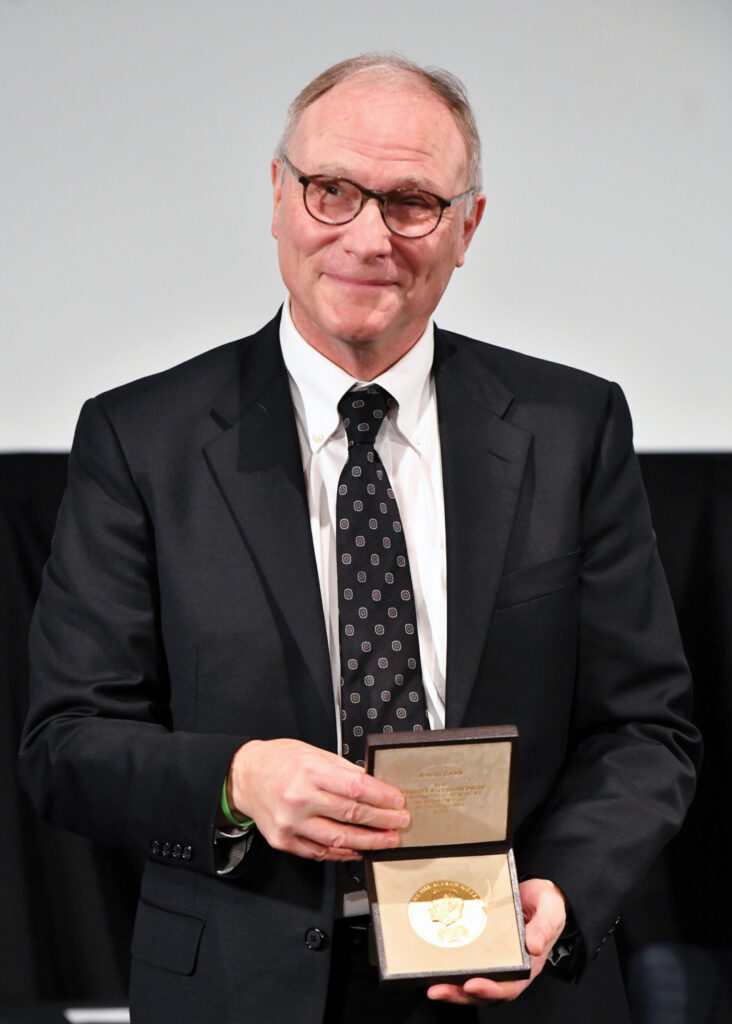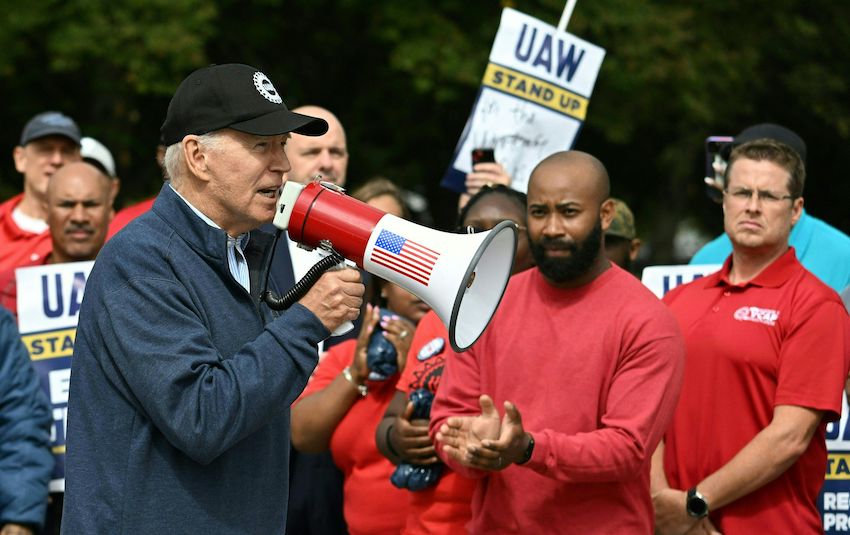Last autumn, David Card received the award for contrarian research he published long ago. By Beatrice Aronson.
Professor David Card was awarded the Nobel Prize in Economic Sciences in 2021 for work that he completed 30 years ago. Studying the effects of minimum wage and immigration, Professor Card used empirical research to dispute the long-held economic assumptions that both were job killers. Using data to add nuance or challenge assumptions is a feat he’s repeated on topics ranging from voting machines to local education options.
A native of Ontario, Canada, Professor Card began his academic journey at Queen’s University. He pivoted from physics to study labor economics because he felt it was more practical. He received a Ph.D. in economics from Princeton University in 1983 and has taught at the University of Chicago, Princeton and Harvard. He’s been at the University of California, Berkeley since 1998 and is currently the Director of the Center for Labor Economics and the Econometric Lab. He has been the recipient of the IZA Prize in Labor Economics and the International Econometric Society’s Frisch Medal, and was named the John Kenneth Galbraith Fellow by the American Academy of Political and Social Science. Professor Card shares his prize with Joshua Angrist of MIT and Guido Imbens of Stanford University.
On a sleepy Thursday afternoon on UC Berkeley’s campus, with shouts from a high school summer program and the chatter of friends on the grassy glade drifting up through an open window, Brunswick intern and UC Berkeley student Beatrice Aronson spoke with Professor Card. In a manner that can only be described as nonchalant, he discussed the current state of the economy, his Nobel Prize win—he thought the call letting him know he had won was a practical joke—and how data from the 1940 Census is driving his next research projects.
Do you think the US labor market will remain tight?
My own view is there’s going to be a recession, and that the market will substantially change. I wouldn’t be surprised to see a fairly big increase in unemployment over the next year. But you never know. I don’t think there’s any way that the current level of tightness continues, because the Federal Reserve is going to fight that. They want to get the rate of growth down a little bit, and they’ll keep raising interest rates until that happens.
And do you think that will help?
Suppose they raise interest rates and manage not to cause the economy to go into a full-blown recession. Actually, real output fell in the first quarter of this year. It’s probably going to fall this quarter, and it’s probably going to fall next quarter—in real terms—because of inflation. I don’t know what the probabilities are, but I think it’s fairly likely that they won’t successfully avoid recession.
Some media outlets are picking up on a trend toward unionization in the United States, specifically in the tech sector. Do you think that’s set to continue?
No. The unions have been declining in the US since the 1950s. And I think when there’s an initial election victory that doesn’t mean that there’ll be a collective bargaining agreement signed. The union could win the vote, but then the company can say, “Well, we’re not ever going to negotiate with them.”
And these days, I think the bigger threat for unions probably is the fact that a lot of the states are controlled by relatively conservative political movements that would like to get rid of unionization in the public sector, which is often under control of the states. I wouldn’t be surprised to see different states adopt rules that reduce the chances for nurses, teachers—state workers—to be part of collective bargaining.
What do you think this means in terms of wages?
Normally unions increase wages somewhat, between the order of 5% to 15% for less skilled workers. So you’d expect some reduction in the wages. But if they replace a union with just a bargaining association that isn’t called a union—for instance, what you see in Texas—it probably doesn’t have that much of an effect.
Is there an economic trend or data point you’re surprised people aren’t paying more attention to?
One thing that I think is a little troubling is we’re running a very large deficit. We have been running a very large deficit for a long time. We’re in the middle of an expansion—really, a boom. And normally you shouldn’t be running a deficit in a boom. You should be trying to cut back a little bit, maybe reduce the deficit. We’ve been accumulating a very large debt overhang—levels not seen since World War II. And it doesn’t cost very much when the interest rate is only 1% or 2%, but it costs a lot if the interest rate gets to 6% or 7%.
Most of that debt rolls over constantly. Eventually, that’s going to put a lot of pressure on the federal government’s budget, and that means that the ability of the federal government to address other problems, like infrastructure, or defense spending, or whatever they wanted to spend it on, is going to be further circumscribed
Why do you think people aren’t paying attention to this?
One cynical view is that the more conservative types really want to cause a very large deficit and a very significant financial crunch so that they can use it to, say, cut back on Medicare or Social Security or other kinds of transfer payments which are a large chunk of spending. And I don’t think you can roll those back easily without a major crisis. I think there’s some plausibility to that.
You’ve written or co-authored so many books and research papers that it’s impossible to characterize your work in just a few words. And yet it’s often summed up as showing that minimum wage doesn’t kill jobs, and that an influx of immigrants does not lower local market wages. Is that an oversimplification?
It depends on the audience that you’re speaking to. Those are two of the papers that are typically highlighted to explain a couple of the things that I was cited for the Nobel Prize. They highlighted others too, but those are the ones that people seem to glom onto. I haven’t worked on either of those topics, really, for 30 years. In a sense it’s like talking about an aging musician’s hits from the ’70s or something. I do a fair amount of other stuff and I’m doing research all the time. But for some reason those are the ones that are easy to explain and very straightforward.
“I haven’t worked on either of those topics, really, for 30 years. In a sense it’s like talking about an aging musician’s hits from the ’70s or something.”
Do you think these ideas took hold because of what was going on in the world at the time?
I never actually presented the study of immigration anywhere. It was published in a very minor journal, a journal that basically no one’s ever heard of. It didn’t attract any attention at the time, to tell you the truth. Even the minimum wage work eventually became somewhat notorious because there was some controversy about it. But the first few papers I wrote on that topic really were kind of low-key as well. Inside of economics, my work on the minimum wage has always been kind of a controversial issue, but outside of economics, it goes up and down in interest
Does the fact that your research can be used politically make you careful about the research you undertake or the questions you pursue? Or is discovery of truth the end goal regardless of any political implications?
I would be cautious about the word “truth.” You know, we never really are sure that we have anything close to the truth. But people who do empirical research in economics are always hoping that they get a little bit closer to understanding what’s going on, in a stylized way.
I don’t think there are any topics I’ve worked on because of concern about political implications. The main reason I choose a topic is if it seems to be interesting and if there seems to be a chance to answer an important question about it with the available data and tools and things.
How do you know when to move on and leave the work on a given topic to others, as you have done with a few things that you’ve worked on?
Sometimes people are very interested in the topic I’m working on. It’s somewhat easier to get results and attention on these results and get people to be thinking about it. Other times they seem not to be very interested in it. And if that’s the case, it’s time to move on, for sure.
So you move on even if you personally are still interested?
There’s usually some other way to think about these questions that people will find more attractive. There’s maybe something wrong with what I’m trying to propose as an answer to a question. They don’t like it, or they don’t buy it. How do you re-pitch the question? And sometimes you think of other ways to address the question a few years later. That’s happened to me in the past.
And you feel like you’ve been able to successfully redress the question?
Yeah, I mean, it’s also specific to some topics. I worked on the topic of minimum wages for a couple years and wrote a book. By the time the book was over, basically everything that I could think of doing was sort of done. And at that time my co-author, Alan Kreuger, and I thought, “Well, everything we do from now on in minimum wage, people are going to look at it like, ‘Oh, these guys are just defending their previous work.’” And that’s not very attractive. We thought it would be better if we just moved on.
“I’m trying to do research on that question across all the cities in the US. … Why are wages higher in certain places and lower in other places?”
Given everything that’s going on in the world, what is most interesting to you and where is your research taking you next?
I’m doing some research on what benefits people get from moving between different labor markets. Wages are higher in San Francisco, but the people who live in San Francisco would earn more in lots of other places as well. It’s hard to know exactly how much a given person would benefit from moving to San Francisco, and so I’m trying to do research on that question across all the cities in the US. That’s a longstanding question of why are wages higher in certain places and lower in other places? Is it basically because the workers that live there are relatively less productive, or is there something about going there that makes you more or less productive? So far, our answers suggest two-thirds is the difference in the workers, and one-third is the difference in the place.
I had been doing another project with the data from the 1940 Census on boys and girls that were taught by male versus female teachers, and realized that this works pretty well. You can prove there’s a benefit to girls to being taught by female teachers—a pretty strong benefit. They end up going to college more and living longer. In thinking about that, I somehow thought of doing a project on Japanese internment.
The internment took place just after the 1940 Census, and it’s now possible to link the 1940 Census forward to later censuses and administrative data. We’re going to try and do a study of the effect of the internment on the Japanese children who were interned. Did it permanently reduce their education relative to what would have happened to them? One of my neighbors is a Japanese American and she was interned, but she grew up on a farm. The Japanese all lost their farms; they were basically stolen. As a result, they moved to the city, which made it much easier for her to go to high school. She thought her education outcome was much different because of the internment. And we might see a different effect for boys versus girls. I think it’ll be an interesting project.
How has your research changed since winning the Nobel Prize?
I have to do more interviews. That’s the main thing, seriously.
Parking is notoriously difficult in Berkeley, and some of the only reserved parking spaces on the UC Berkeley campus are set aside for the university’s Nobel Laureates. Have you been taking advantage of your parking spot?
Once a month, maybe, or once every couple months. I might use it if it’s raining. But the traffic is so bad going home, it’s actually faster for me to walk than to drive some days. It’s kind of inefficient.
The other thing is: I’m going emeritus next year, so it’s not going to do me any good.
More from this issue

Acceleration
Most read from this issue

Unapologetically, Uniquely Us





